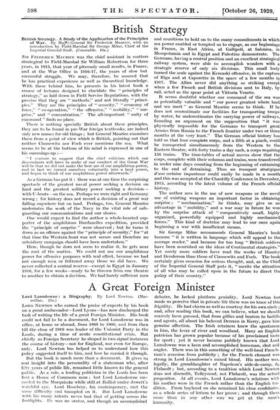British Strategy
British Strategy. A Study of the Application of the Principles of War. By Majer-General Sir Frederick Maurice, with an introduction by Field-Marshal Sir George Milne, Chief of the Imperial General Staff. (Constable. 10s.) SIR FREDERICK MAURICE was the chief assistant in matters strategical to Field-Marshal Sir William Robertson for three years, in 1915, that year of piteously small results, in France,
and at the War Office in 1916-17, the years of slow but successful struggle. We may, therefore, be assured that he has practical experience as well as theoretical knowledge.
With these behind him, he presents in his latest book a eburse of lectures designed to elucidate the "principles of strategy," as laid down in Field Service Regulations, with the proviso that the/ are "methods," and not literally "princi- ples." They are the principles of "security," "economy of force," "co-operation," "the offensive," "mobility," "sur- prise," and "concentration." The all-important unity of counnand " finds no place.
There is nothing specially British about these principles, they are to be found in pre-War foreign textbooks, are indeed only new names for old things ; but General Maurice examines them from a point of view which is British, pointing out that neither Clausewitz nor Foch ever mentions the sea. "What seems to be at the bottom of his mind is expressed in one of his summings-up :—
" I venture to suggest that the chief criticism which our descendants will have to make of our conduct of the Great War will be that we did not make the best We of our amphibious power, and in fact we turned ourselves voluntarily into a land power, and began to think of our amphibious power afterwards."
As a German has put it : there was at one time the surprising spectacle of the greatest naval power seeking a decision on land and the greatest military power seeking a decision— with U-boats—on the sea. Perhaps we were right and Germany wrong ; for history does not record a decision of a great war falling anywhere but on land. Perhaps, too, General Maurice underrates the work of the Navy in the vital role of safe- gbarding our communications and our shores.
One would expect to find the author a whole-hearted sup- porter of the amphibious Dardanelles expedition, provided the "principle of surprise" were observed ; but he turns it down as an offence against the "principle of security," for "at that time the Western front was not secure and therefore no subsidiary campaign should have been undertaken."
Here, though he does not seem to realize it, he gets near the root of the matter. We could not use our amphibious power for offensive purposes with real effect, because we had not enough men or frittered away those we did have. We never collected a central reserve—except in Egypt in January 1916, for a few weeks—ready to be thrown from one theatre to another to obtain a decision. We had barely sufficient men and munitions to hold on to the many commitments in which sea power enabled or tempted us to engage, as our beginnings in France, in East Africa, at Gallipoli, at Salonica, in Mesopotamia and in Egypt and Palestine demonstrate. The Germans, having a central position and an excellent strategical railway system, were able to accomplish wonders with a strategic reserve of only six divisions. This small body turned the scale against the Kerenski offensive, in the capture of Riga and at Caporetto in the space of a few months in 1917. The Allies never did anything so striking except when a few French and British divisions sent to Italy, by rail, acted as the spear point at Vittoria Veneto.
, It seems doubtful whether our command of the sea was as potentially valuable and "our power greatest where land and sea meet" as General Maurice seems to think. If he does not overestimate our facilities for transporting troops by water, he underestimates the carrying power of railways, founding an argument on the supposition that it was physically impossible for the Germans to transport great Armies from Russia to the French frontier under two or three months at the very least." The German official history has told us that four complete corps, and a fifth at a pinch, could be transported simultaneously from the Western to the Eastern theatre, with forty trains a day each, a corps requiring 156 trains. The time-tables of actual moves show that the corps, complete with their columns and trains, were transferred in under nine days counting from the beginning of entraining to the end of detraining. Thus un transport strategique d'une certaine importance could easily be made in a month and this was accepted at the Chantilly Conference in December, 1915, according to the latest volume of the French official history.
The author sees in the use of new weapons or the novel use of existing weapons an important factor in obtaining surprise; "mechanization," he thinks, may give us an advantage in "mobility," and a war may in future be won by the surprise attack of "comparatively small, highly organized, powerfully equipped and highly mechanized forces." This kind of doctrine may lead to our once again beginning a war with insufficient means.
Sir George Milne recommends General Maurice's book because "it is written in language which will appeal to the average reader," and because for too long "British soldiers have been nourished on the ideas of Continental strategists." Yet surely more soldiers have read the works of Hamley and Henderson than those of Clausewitz and Foch. The book certainly gives occasion for serious thought, and, as the Chief of the Imperial General Staff puts it, "merits the attention of all who may be called upon in the future to direct the policy of their country."


















































 Previous page
Previous page